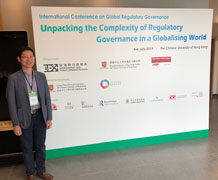
Dr Joseph Lee at the Unpacking the Complexity of Global Regulatory Governance Conference.
Dr Joseph Lee on enhancing access to finance in the era of digitisation
Dr Joseph Lee of Exeter Law School contributed to a panel on financial technologies jointly with Professor David Donald of the Chinese University of Hong Kong (CUHK) at the Unpacking the Complexity of Global Regulatory Governance Conference in Hong Kong in July 2019.
The panel looked at the benefits and risks of some user cases of Fintech and discussed how current regulatory objectives such as market safety confront with other societal values. The panellists discussed how artificial intelligence (AI) may amplify biases and discrimination and may sleep-walk us into another financial crisis. Professor Donald showcased how AI may be used in developing economies and examined some user cases by the World Bank. He then identified the problem of gender biases as an obstacle to development and how AI could be used to remove discriminatory practices to improve equality.
To echo this finding, Dr Lee raised some concerns about financial institutions using algorithms developed with biased data and showed how such algorithms can lead to further discrimination against minorities and the vulnerable in the financial services sector. He argued that measures to combat inequality must be set high on the regulatory agenda. Specifically, fairness toolkits against bias and discrimination should be in place to provide guidance in the design, development and deployment of AI to meet the objective of access to finance. Dr Lee also stated that ‘if technology is to make some transformative effect on the financial services sector, business models of financial services providers built on bias and discrimination must be corrected. Policy makers, regulators, and the industry must make ‘fairness’ a strong policy choice in the AI regulation discourse'.
The panellists also discussed how AI is being used for capital optimisation in peer-to-peer lending platforms and how ignoring privacy issues can significantly affect individuals’ willingness to participate in such platforms and societal trust to develop a shared economy. Current data protection law does not adequately protect individuals against bias and discrimination. It is also difficult for disadvantaged consumers to use anti-discrimination law to claim redress. Accordingly, there should be a duty to actively remove bias and discrimination in the use of AI rather than just a negative one to avoid discrimination. Senior management should directly assume such a duty in the development of AI and should not delegate it away.
The panel discussion was attended by academics, legal practitioners, and regulators from China, Hong Kong, Australia, UK, Germany and Switzerland. Members of the audience also questioned how technology will affect the legal and ethical standards required of humans. Dr Lee pointed out that using data analytics such as RegTech should not lower the procedural standards required of the law enforcement agencies.
Dr Lee and Professor Donald have formed an international and multidisciplinary research team to research into AI and data law and ethics in the financial services sector. The other researchers are from Bocconi University, the Universities of Fribourg, Geneva and Kyoto and National Taiwan University. They will be working with Swiss Infrastructure and Exchange (SIX), the London Stock Exchange Group (LSEG), the Taiwan Stock Exchange (TWSE) and Alston & Bird to produce toolkits for ensuring access to finance.
Date: 31 July 2019
